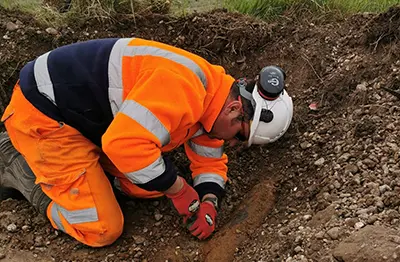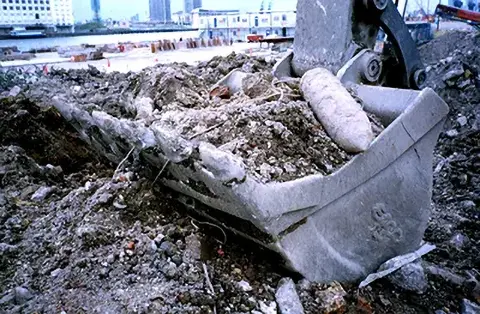What’s the value of UXO risk mitigation services?
What value do unexploded ordnance (UXO) risk mitigation services bring? What's the potential impact of UXO and who does it affect? Get all the answers to your frequently asked questions here.
What’s the value of UXO risk mitigation services?
UXO stands for unexploded ordnance.
In the UK, the majority of the risk from unexploded ordnance is a legacy from the German bombing during WWII. It’s a common misconception that bombing only affected London and the south-east; in fact, towns and cities across the UK were heavily bombed meaning UXO can be found almost anywhere across the country.
In addition to the threat resulting from German bombings, land used during WWII by British and Allied forces also poses a risk. This is because UXO could remain on sites that were used for training and testing, on airfields and where munitions were produced, or on land that was used for defence purpose.
If the risk of encountering UXO on a site is overlooked and ordnance is discovered further down the line, this can cause:
- Site evacuations
- Public transport cancellations
- Road closures
- Delays to projects
- Unforeseen expenditure
- Brand reputation damage
- Risk of property damage
- Risk of severe injury
- Risk of loss of life
In other words, unexploded ordnance represents a more significant cost, time and safety risk when preliminary threat analysis is neglected.
“UXO has been there for ages without detonating, why is it a health and safety risk at all?”
Although any unexploded ordnance lurking beneath the ground failed to detonate upon impact, the item still contains highly explosive materials and was designed to kill.
As a device ages it corrodes and becomes less stable. This means a change to the state of the device caused by heat, vibration or impact for example, could trigger an explosion.
For many sites across the UK, the UXO risk may be inconsequential. However, without a thorough understanding of your site's history, you cannot make informed decisions about your UXO risk mitigation strategy.
Igne has a dedicated in-house research team that can provide historical site analysis for you, in the form of a threat assessment. This will enable you to determine whether you need further surveying or clearance services - or not.
Who is affected by the risk of encountering UXO?
If not mitigated, the risk of discovering UXO on your site can have a significant knock on effect – parties affected include:
Manual workers: when UXO is discovered on land, it will likely be found by manual workers during excavation works for infrastructure or construction purposes. From a health and safety perspective, this means they are the most vulnerable if they hit or disturb a device.
Construction managers: for construction firms, not only does UXO pose a significant safety risk to staff and the general public, but the unexpected discovery of ordnance can also impact project timelines and budgets. If not factored in initially, any further ground analysis needed, or the removal of any threat can result in delays and unforeseen expenditure.
HSE managers: for health and safety managers, the risk from encountering UXO is obvious – i.e., if intrusive groundworks trigger a device to detonate, the damage could result in loss of life, injury and property damage.
The local community: UXO poses a risk to the local community in the surrounding areas of a find in the event of an explosion. In addition to this, the uncovering of a suspicious item can lead to evacuations that impact day to day life, resulting in a disgruntled community and reputation damage for you.
Public transportation services: if UXO is discovered near public transportation – such as an airport or railway line – this will result in delays, diversions, cancellations and cost.
How can Igne’s UXO risk mitigation services benefit all those affected?
Construction Managers
For Construction Managers, mitigating the UXO risk will help keep your project on track by:
- Preventing delays by ensuring any risks are mitigated early on, and if further detection or clearance work is needed, the time costs associated can be planned for accordingly.
- Avoiding unforeseen expenditure that may come due to detection or clearance being needed further down the line. This could result in potential changes to tight project timings, and even staff being put on standing.
- Providing better insight into ground conditions with surveys. The surveying process doesn’t just help detect suspicious ferrous objects beneath the ground’s surface. Igne’s engineering and detection capabilities can be easily adapted to assist clients identify complex ground conditions such as voids or obstructions.
- Utilising adaptable equipment. Although Igne’s drills and rigs are primarily used for UXO detection purposes, they can be adapted to clear through challenging ground conditions – clearing pile positions impacted by underground obstacles for example. Igne’s team has extensive engineering experience and skills that can help you overcome any ground challenges you’re facing.
- The removal of UXO. Historical information is indicative in terms of the potential presence of UXO, it’s not definitive. Understanding the history of your site helps inform your UXO risk mitigation process. As well as having a dedicated research team, Igne employs geophysical engineering experts who can determine where ferrous objects are lurking beneath the surface, and whether they are a threat. Igne also has its own in-house explosive ordnance disposal engineers. The use of rigs and cone penetration testing trucks enables these experts to safely detect and remove explosive threats, empowering you to continue your project uninterrupted by UXO.
HSE Managers
For HSE managers, unexploded ordnance risk mitigation services help prevent escalated risk further down the line.
The services we provide do this by:
- Insuring the risk for you. That’s right! When you employ our UXO mitigation services, Igne insures you against explosive risk, providing peace of mind by protecting your team and commercial assets.
- Providing historical understanding with preliminary threat assessments. Igne’s dedicated research team uses historical documents, bombing reports, archives, data and other resources to provide a thorough assessment that can support risk assessments.
- Compliance with CIRIA C681 guidelines that state: ‘The possibility of UXO being encountered on a site falls within the category of a potentially significant risk, and it should be addressed as early as possible in the life cycle of a project.’ Igne’s services ensure compliance with these requirements.
- Mitigating risk for staff by analysing, assessing and / or removing the threat. In addition to the mitigation, detection, and removal services Igne has also created accredited continual professional development courses that can be specifically tailored for construction teams. This helps ensure that they have a thorough, competent understanding of the threat and the safest way to respond in the event of encountering the threat.
- Mitigating risk for the wider community by utilising detection and removal services as needed to ensure the risk level is understood and the correct approach is taken.
Construction Workers
For construction workers, Igne can help ensure their safety and can provide further career development by providing:
- Continual professional development (CPD) with the delivery of accredited training courses. These courses provide insight into the history of UXO, common types of ordnance, and what to do if it is encountered. This training helps keep staff safe, teaches them useful skills for their time on site, and provides the opportunity to gain some explosive knowledge!
- Safer working environments are provided as a result of training and services. As a construction worker, there is risk associated with the job. This may come from operating machinery, carrying heavy loads, or working on roadsides for example. When employees take precautions regarding UXO, they make their working environment a little bit safer.
Emergency Services
Emergency service responders go into situations with unknown risk elements every day. UXO risk mitigation services can support the emergency services with:
- Increased awareness to inform their ability to handle situations where UXO may pose a risk in dangerous situations. When dealing with high risk situations, information is key to keeping responders and civilians safe. CPD accredited training and awareness briefings equip emergency first responders with vital information to inform their understanding of explosive threats.
- Practical understanding of the threat, the issues posed by it, and what ordnance may look like.
- Ongoing support from Igne’s experts. The team are always available to provide insight and guidance as needed and have a rapid response service in the event of any unexpected find.
The General Public
UXO services protect the safety and day to day lives of the general public by:
- Safeguarding them against avoidable risks that could have catastrophic impacts.
- Avoiding disruptions to day to day life by mitigating threats to prevent evacuations or transport cancellations.
Within the UK, UXO risk mitigation services enable:
- The development of transportation and infrastructure services including roads, airports, and docks
- The safe construction of homes and community enrichment facilities such as shopping centres, restaurants, and leisure facilities
- Education facilities to be enhanced in a safe way
UXO risk mitigation services enable the UK to develop for the future, without being impacted by wars of the past.
If you have any questions about unexploded ordnance or Igne’s suite of services, contact the team today for a free consultation.
Other articles of interest

Ordnance found in Shrewsbury
Unexploded Ordnance (UXO) has been found in Shrewsbury three times in three weeks. Why is Shrewsbury facing this contamination issue, and what can be done about it?

Why is UXO still found in Rotherwas, Hereford?
Yesterday, a hand grenade was found in Rotherwas, Hereford. Why is unexploded ordnance (UXO) still found in Rotherwas, Hereford, over 70 years since WWII ended? Learn about Rotherwas' munitions factory, Luftwaffe bombings, and why UXO risk assessments are important for intrusive ground works.


